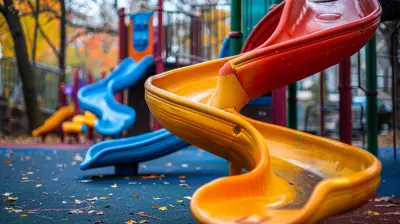Supporting Your Child’s Learning Journey with Encouragement
26 June 2025
Let’s be real, parenting is like being a combination of a chef, taxi driver, therapist, life coach, and part-time detective (because who took the last cookie?!). But when it comes to our child’s learning journey? Well, buckle up, because that ride comes with plot twists, late-night homework meltdowns, and the occasional “I forgot I had a project due tomorrow” panic.
If you’ve ever stared blankly at a math worksheet that looks like ancient hieroglyphics or had your child sob because they “just can't do it,” then hey, this one's for you. Supporting your child’s learning journey with encouragement isn’t about turning your kitchen into a mini classroom with reward charts wallpapering the fridge (though stickers are magical). It’s about being their biggest cheerleader without losing your mind in the process.
Let’s break this parenting mission down. Grab a cup of (probably cold) coffee and let’s get into it.
Why Encouragement Beats Pressure — Every Time
Remember when you were a kid and someone said, “You HAVE to do this”? Chances are, you immediately didn’t want to. That’s human nature. Now imagine your child, with all their tiny emotions and wiggly energy, being told that over and over. Pressure doesn’t spark growth—it sparks anxiety.Encouragement, on the other hand? It sparks confidence. It's like putting floaties on when they first learn to swim—you’re not doing the swimming for them, but you’re making sure they don’t sink.
Encouragement fuels learning because it:
- Builds self-esteem
- Promotes a growth mindset
- Reduces fear of failure
- Makes learning feel safe and fun
And who wouldn't want that?
The Power of "You Can Do It!"
Okay, so you’ve probably said, “You can do it!” a thousand times, but here’s the thing—it actually helps. Our words matter. Kids are tiny sponges with ears, and when we feed them positive reinforcement, we help shape their inner voice.Imagine your kid facing a math problem. If they hear your voice in their head saying, “You’re smart, and you’ve got this,” versus “You always mess this up,” what do you think sticks?
So go ahead—be that annoying overly enthusiastic parent. Channel your inner motivational speaker:
- “Hey, that’s tricky, but I love how you’re sticking with it!”
- “Mistakes mean your brain is growing. You're basically a brain bodybuilder right now.”
- “You used to struggle with this and look at you now!”
Because truly, cheering kids on matters way more than perfect grades.
Create a Safe Space for Messing Up (Seriously)
Let your child fail.Wait... what?
Yup. You read that right. Failure is not a parenting fail. It's how kids—heck, all of us—learn. And unless your kid is a robot or a unicorn (in which case, we need to talk), they’re going to hit bumps along the learning road.
Make your home a judgment-free zone. If your child bombs a quiz, forgets their homework, or melts down over fractions, respond with calm. Be the eye of their storm, not another bolt of lightning.
Say things like:
- “Oops, that didn’t go how you hoped. Let’s figure out what we can do next time.”
- “I mess up too. Want to hear about the time I sent an email to the wrong person? Yikes.”
Normalizing mistakes is not lowering your standards—it’s raising emotionally intelligent, resilient kids.
Be Present (Even If You Don’t Get Algebra)
Here's a parenting secret no one talks about: You don’t need to be an expert to help your child learn—you just need to show up.Seriously, even if the last time you solved for X was during the Bush administration, your presence still means the world. Kids aren’t looking for perfect explanations; they’re looking for connection.
So:
- Sit next to them while they do homework
- Ask questions like “What’s the hardest part?”
- Offer snacks. (Because snacks are basically love in edible form.)
If you don’t know the answer, be honest. Say, “Let’s figure it out together,” and teach them how to find the answer. You’ve just modeled curiosity, problem-solving, and humility—all in one go.
Celebrate the Process (Not Just the Grades)
Gold stars are great, but what about giving props for effort?Shift the focus from results to process. Celebrate when your child studies hard, asks questions, or rewrites that essay for the third time—even if the final grade isn’t perfect. Because those habits will outlast any report card.
Try saying:
- “I saw how hard you worked on that project—super proud of your hustle.”
- “Wow, you didn’t give up even when it was tough. That’s what winners do.”
Grades measure one moment in time. Grit, persistence, and curiosity? Those are lifetime skills.
Show Interest in Their Passions (Even if It’s Minecraft or Bugs)
Let’s be honest—listening to an hour-long monologue about Minecraft mobs or weird bug facts can feel like a test of your sanity. But you sitting there, mildly confused and smiling while they go off on their latest obsession? That’s what support looks like.When you show interest in the things they love, you’re telling them their thoughts matter. You’re also keeping communication open, which pays off big time as they grow (especially when the teen years hit like a hormonal tornado).
So nod along, ask questions, and maybe even play a game or two. It’s worth it.
Set Realistic Expectations (Not Instagram-Worthy Perfection)
Spoiler alert: Your child is NOT going to be great at everything. And that’s okay.Let go of the idea that your kid needs to:
- Be reading three grade levels ahead
- Speak fluent Mandarin
- Play the violin like a baby Mozart
Let them be who they are.
Support them where they are, not where you wish they were. When you focus on their journey instead of comparing it to others, you help them feel secure and capable. That’s when the real magic happens.
Watch Your Own Language (You're the Life Narrator Now)
Ever notice your kid parroting things you say—including the stuff you wish they’d forget? Yeah, same.Kids pick up on everything. So if they hear you say “I’m terrible at math,” they might start telling themselves the same story. We become their inner monologue.
What can you say instead?
- “I used to find this hard too, but I kept practicing.”
- “Hmm, I’m not sure how to solve this—wanna help me look it up?”
The way we talk about learning, our abilities, and even our own failures shapes theirs too.
Catch 'Em Doing Something Right
Ever notice how easy it is to spot when your kid messes up? It's like we have a radar for the noise, the chaos, the spilled milk. But what if we trained ourselves to catch them doing things right?You don’t need to throw a parade every time they pick up their socks (although that would be fun), but a simple, “Hey, I noticed you kept working even when that was tough—awesome job,” goes a looooong way.
A little praise for effort can light a fire that keeps them going—even on days when learning feels like climbing Mount Everest in flip flops.
Make Room for Fun (Yes, Even on School Nights)
Learning doesn’t have to be stiff or boring. You can absolutely mix in fun without sacrificing structure.Board games, puzzles, silly educational YouTube channels, science experiments with baking soda—all of that counts. Heck, cooking dinner and reading recipes is a lesson in math, science, and reading comprehension. Boom. Bonus points for cleaning up.
When learning feels playful, kids engage more. They remember more. And they grow more. Besides, no one wants to live in a house where learning feels like a prison sentence.
Give Yourself Grace Too (Seriously, You're Doing Great)
Let’s not forget the unsung hero here: YOU.You're juggling life, work demands, laundry piles, dinner plans, and somehow still finding time to encourage your child’s learning journey. That’s a lot. And you’re doing better than you think, even if you don't always feel it.
You don’t need to be Pinterest-perfect. You just need to show up, love your little human, and keep cheering them on—even on the hard days.
Encouragement isn’t about being everything. It’s about being present, being real, and being their safe space as they navigate this big, weird, wonderful world.
So take a breath, parent-pal. You’ve got this. And so do they.
Final Thoughts: It’s the Little Things That Matter Big
Supporting your child’s learning journey with encouragement isn’t about teaching them everything—it’s about showing them they’re not alone. It’s cheering from the sidelines when they score and when they stumble.It’s the “I believe in you,” “Tell me about it,” and the “You’re trying, and that’s awesome.”
Because in the end, it’s not about raising perfect students. It’s about raising confident, curious, kind-hearted humans who believe in themselves—because you believed in them first.
And that’s the most powerful lesson of all.
all images in this post were generated using AI tools
Category:
Positive ParentingAuthor:

Liam Huffman
Discussion
rate this article
2 comments
Sebastian Sharp
Every word of encouragement you share plants a seed of confidence in your child's learning journey. Celebrate their efforts, no matter how small, and watch them blossom into resilient, lifelong learners. Your support is their greatest strength!
December 1, 2025 at 4:27 PM

Liam Huffman
Thank you for your insightful comment! Encouragement truly nurtures a child's confidence and growth. Let's continue to celebrate every step of their learning journey!
Dixie Rosales
Supporting your child's learning journey is about fostering a nurturing environment where curiosity thrives. Celebrate their efforts, not just achievements, and provide a safe space for mistakes. Your encouragement helps build resilience and confidence, allowing them to explore, learn, and grow at their own pace. Every step matters on this journey.
June 29, 2025 at 2:53 PM

Liam Huffman
Thank you for your insightful comment! Fostering curiosity and resilience is indeed key to supporting a child's learning journey. Celebrating efforts and providing a safe space for growth makes a significant difference.


